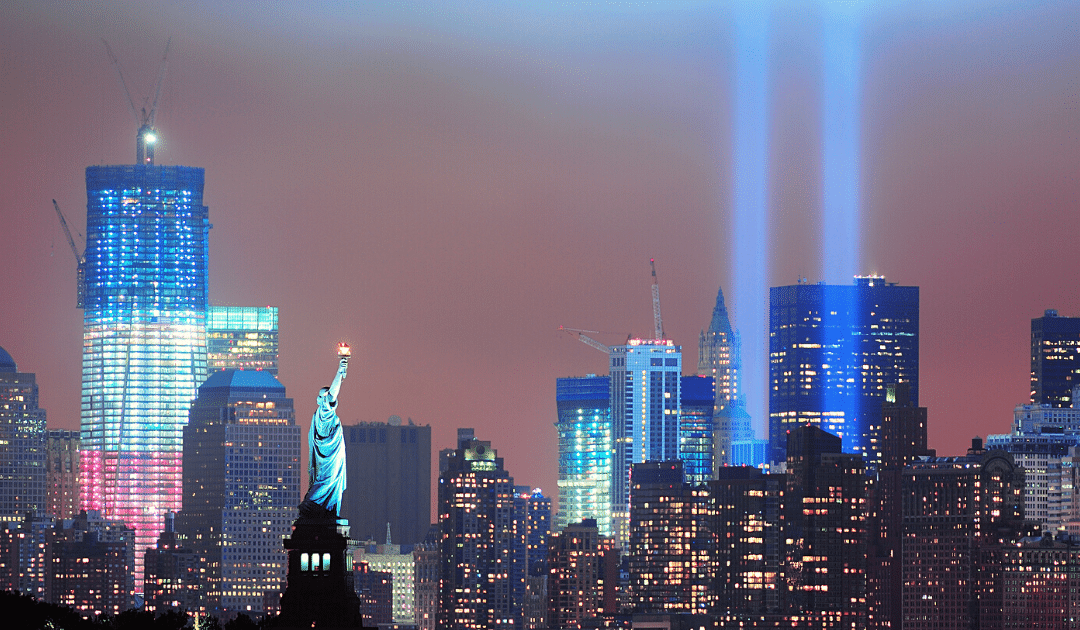About an hour after the first plane struck the World Trade Center on the morning of September 11, 2001, Michael Wright found himself on the 81st floor of the North Tower, trapped in complete darkness and smoke. That’s when he heard the rumble: The South Tower was collapsing.
“I was lucky enough to be next to a first responder,” Wright said. “I can credit him for the fact that I am alive now.”
For John McLaughlin, rescuers found him the next morning, buried in the ruins of building two. “The last bits of rubble were cleared, and they were able to pull me out with nylon straps,” he said.
Survivor Wendy Lanski recalled how after the planes struck, “Police and firefighters and EMS workers were everywhere … [they] were coming up to us, grabbing us in groups, saying, ‘Go out this door, run across the street, cover your head, and don’t look up.’” As she and her colleagues rushed to escape the building, first responders were charging in, intent on saving lives.
Tragically, many of them never made it out. In all, 412 first responders – 343 firefighters, 24 law enforcement officers and 8 emergency medical personnel – were lost when the towers fell. With them, 2,565 people in and around the buildings.
Unprecedented
September 11, 2001, marks the deadliest terrorist attack in U.S. history, when four commercial planes were hijacked by members of al Qaeda and flown into buildings in New York City and Washington, D.C. The fourth was thwarted when passengers resisted, causing it to crash into a field in Pennsylvania instead of its intended target.
The attack left Americans reeling in shock, horror, and grief. In an instant, devastation rippled out across families, communities, and the nation.
In sharing that heartbreak and devastation, though, Americans came together. Within hours, an incomprehensible tragedy had galvanized a renewed spirit of national unity.
Much of that was sparked by the stories of courage and heroism that had emerged within minutes of the attack. Strangers risking their lives to run back into the towers to save others. Office workers staying behind for friends who were trapped or had disabilities.
And, of course, the hundreds of first responders – the warriors who rushed in to save lives, despite the overwhelming danger. Over the next days and weeks, countless stories like those of Wright, McLaughlin, and Lanski emerged, painting a profound story of the best of humanity.
Remembering the Fallen
Besides being the single deadliest attack in human history, 9/11 was also the single deadliest incident for firefighters and law enforcement officers in U.S. history.
As we take time on 9/11 to reflect on the national tragedy that occurred 20 years ago, we will remember the heroes who made the ultimate sacrifice that day. They were fire, EMS, and law enforcement personnel, but more importantly, they were husbands, fathers, wives, mothers, brothers, sisters, friends, and beloved colleagues.
How You Can Honor Them
Here are some ways you can honor our 9/11 heroes:
- Visit a memorial. There are memorials and monuments at or near the sites of the attacks, as well as across the country. The 9/11 Memorial & Museum also offers an online experience to learn more and pay tribute.
- Help 9/11 responders. Due to the chemicals and toxins released at the attack sites, many 9/11 first responders have since developed or died from illnesses such as cancer, respiratory diseases, and other chronic conditions. Support organizations that are directly helping responders who’ve fallen ill.
- Support your local first responders. By supporting your local heroes, you are giving thanks to all those who answer the call to serve and protect. Say yes to that next pledge or fundraising drive hosted by your community’s firefighter or police department.
If you are a first responder, you can:
- Join a 9/11 memorial stair climb. Every year, thousands meet up to climb the equivalent of 110 stories, the height of the World Trade Center towers. Normally held in office buildings, convention centers, and stadiums, this year the stair climb events are mostly virtual. Find one near you.
- Engage with your community. Although your job is serving others, doing so in your off hours – for causes close to your heart or in different areas of interest – will bring you closer to your community and first-responder network. Find a cause that could use your expertise or energy, or educate others about the EMS profession and inspire the next generation of first responders.
- Practice self-care. Learn to be aware of and manage your stress levels. Employ healthy coping mechanisms, take care of your mind and body, and be sure to reach out if you need to talk with someone or get support. Be there for your first responder family, many of whom are at increased risk of suicide.
Although we can’t erase the tragic events that took place 20 years ago, we can honor its fallen heroes by being kind and generous toward our neighbors and finding ways to serve in our communities.
This article is furnished by California Casualty, providing auto and home insurance to educators, law enforcement officers, firefighters, and nurses. Get a quote at 1.866.704.8614 or www.calcas.com.
- Graduation – When to Remove Your Child from Your Auto Policy - May 18, 2023
- How to Prevent Catalytic Converter Theft - May 17, 2023
- How Much Does Home Insurance Cost? - May 17, 2023

